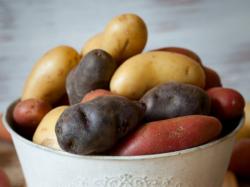New USPB Consumer Research Focuses On Younger Audience
December 17, 2013 | 4 min to read

DENVER — The United States Potato Board (USPB) is committed to designing and conducting consumer research that enables the industry to identify opportunities and make informed decisions to increase demand for potatoes. In order to identify new opportunities and promote a proactive and forward-looking approach, the USPB is taking a closer look at a younger audience. The up-and-coming generation (18–30-year-olds), just now forming new households and starting families of their own, is big! In fact, the Millennial generation is about 80 million people, about the same size as the Baby Boomer generation. To stay relevant and increase demand for potatoes, it will be critical to understand Millennials and how potatoes fit into their lives—now and in the future.
With this in mind, the USPB is conducting research to…
• Better understand the Millennial audience, especially attitudes and behaviors related to potatoes
• Explore opportunities to increase potato consumption among Millennials
• Identify sub-segment(s) within the Millennial audience with the greatest potential for growth in potato consumption
The project consists of three phases:
Phase 1: Secondary research and database mining
• Data on the Millennial audience from past USPB consumer research
• Online databases for information on Millennial attitudes and eating habits
• Articles and syndicated studies relating to Millennials
Phase 2: Consumer segmentation (quantitative)
• Online survey among Millennials to identify and size different consumer groups within the Millennial audience based on food and lifestyle attitudes and behavior
Part 3: Segment deep-dive (qualitative)
• In-home interviews and focus groups with select segments of Millennials
Findings to date:
As a generation, Millennials are highly food-involved. Along with being food-involved comes an interest in and affinity for cooking. For many Millennials, cooking isn’t a job or responsibility, but rather a passion, as is going out to eat. They’re looking for more from their meals—not just something to fill them up, but something to experience.
However, Millennials are also a highly budget-minded generation. Good value for the money is the most important attribute when choosing food for a meal at home or in a restaurant.
Millennials are busy. About one-third (34%) of dinner occasions at home are time- and/or energy-constrained situations. Despite often being energy- or time-constrained, Millennials are cooking from scratch twice as often as they are using frozen foods or boxed meal helpers.
They’re primarily shopping at traditional grocery stores and supercenters, and 16% are also using home delivery services.
When it comes to potatoes, though, Millennials are not significantly different from the rest of the population. Potatoes are primarily consumed for dinner at home as the main component of a side dish. Mashed, baked and French fries are the top three potato preparations. When preparing potatoes at home, 73 percent are using fresh, and of those, 51 percent are using russet. According to previous USPB studies, this is right in line with what older generations are doing.
Attitudes about potatoes among Millennials are very positive. Eighty-nine percent rate potatoes “excellent” or “good” for being a good value, and 88 percent rate potatoes “excellent” or “good” for being something everyone would enjoy. In fact, potatoes rate highest on what’s most important to Millennials.
- Avoiders prefer routines and packages. They want meals to be fast, quick, easy and convenient. Therefore, avoiders often eat frozen or boxed foods, and if they must cook, refer to their go-to routine of what to make. They skew a little older (late 20s) and Midwest.
- Nurturers are similar to the current target (moms). They like to experiment with new recipes and cook for the taste and enjoyment of it, not for nutrition. Nurturers are looking to put something on the table that everyone will enjoy; so flavor, satisfying cravings and ease are all of upmost importance. They also skew to the Midwest.
- Entertainers are foodies at home. They love to experiment with new, creative recipes that use start-from-scratch ingredients and enjoy sharing their cooking with others. Entertainers aspire to be at-home gourmet chefs and find relaxation through cooking. In addition, they are also health aware and nutrition conscious.
- Explorers are foodies outside of home. They want adventurous foods that are new and exciting. Explorers are health involved and watch their diets and weight; however, they are more concerned with convenience than nutrition. Explorers are likely to be male, single and living in the Northeast.
- Health Seekers base all food choices on health and nutrition. They watch their diets, exercise consistently and choose natural and unprocessed foods. However, they are also looking for meals that are easy to prepare. They are more likely to be living in the West.
Next steps are to visit with Entertainers and Explorers to learn more about how they eat, cook and shop and, most importantly, identify opportunities to increase potato consumption among these segments.
For more information on the USPB as the nation’s potato marketing organization, positioned as the “catalyst for positive change,” and the central organizing force in implementing programs that will increase demand for potatoes, please visit www.uspotatoes.com.
David Fairbourn is Manager, Industry Communications & Policy, at the United States Potato Board in Denver. The mission of the USPB is to increase demand for potatoes and potato products through an integrated promotion program, thereby providing US producers with expanding markets for their production. David can be contacted at 303-369-7783 or david.fairbourn@uspotatoes.com. For complete information about the programs, ROI results, resources and tools available to all members of the industry through the USPB, please visit www.uspotatoes.com. The United States Potato Board—Maximizing Return on Grower Investment.
Source: United States Potato Board
